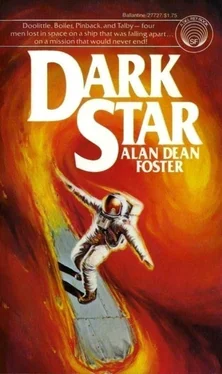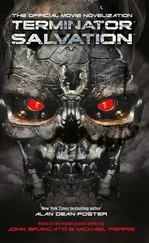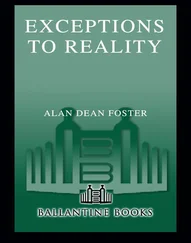That music.
THEY CONTINUED ON that way through space—the Dark Star ’s drive engines eating up the light-years, each man occupied in his own thoughts. So no one monitored the detection instruments, no one saw the thing appear.
Talby was intent on the stars behind them, and his three fellow crewmembers concentrated on the music inside them. So they didn’t see the initially faint, still incredibly distant luminosity that had appeared in the path of the ship. Didn’t see the twister of free energy that danced and leaped and frolicked among a million-kilometer-long cluster of uneven fragments. Fragments of a long-dead world in a long-forgotten system, perhaps even a system set in a galaxy other than this one.
Some of these fragments carried a strong negative charge, others positive. Some were neutral, and some possessed electrical properties that would have driven an energy engineer to hysterics. Gigantic discharges of brilliantly colored energy played about the millions of solid components that formed the vortex.
It was the sixth member of the Dark Star ’s crew, the one immune both to astrophysical daydreaming and to electric rock mesmerism, who finally noticed the rapidly approaching threat. And it was this sixth member who cut off the music to the control room.
Pinback, Boiler, and Doolittle slowed, stopped their in-place dancing. At first Doolittle thought that it was just another of the seemingly endless series of mechanical malfunctions. A soft female voice corrected him moments later.
“Attention, attention, ship’s computer calling all personnel. I have been required to disengage your recreational music. Repeat. Ship’s computer to all personnel, this is an emergency override. All systems must stand by for emergency directive. Information for procedure will follow.”
“What the hell?” muttered Doolittle.
Pinback looked over at him wide-eyed, questioning. Boiler just sat and muttered. “Better be something damned important to break into my music.”
“Extrasolar concatenation of solid matter of uncertain properties is approaching at point nine-five light-speed on collision course. Predictions indicate that the body of matter is fairly dense, yet still spread too widely for us to avoid it without risking permanent structural damage to all noninorganic personnel on board.”
“Why can’t you call it an asteroid storm like I asked you to?” Doolittle complained.
“For the same reason,” the computer voice shot back, a little peevishly, “that I cannot refer to you as Grand Admiral Doolittle of His Majesty’s Terran Imperial Fleet Forces, Lieutenant. Both are nonscientific, inaccurate, imaginary references concocted by you while acting under the influence of juvenile literary material and—”
“Call it an asteroid storm,” Doolittle warned, having totally forgotten that something important was about to happen, “or I’ll see your primary circuit disconnected.”
“You cannot do that, Lieutenant,” said Pinback, shocked.
“You cannot do that, Lieutenant,” confirmed the computer. “My primary circuit cannot be disengaged while outside of Earth Base’s broadcast influence, and only under the direct supervision of…” There was a pause while hidden instruments monitored the lieutenant’s internal configuration of the moment.
“However, I will take your current mental state into account. The… asteroid storm …”
“That’s better,” grinned a satisfied Doolittle.
“… is approaching the ship on collision course.”
“Doesn’t mean a thing,” Doolittle said smugly to the others. “We’ll slip through even the densest storm without meeting anything bigger than a pebble, and our deflectors will handle any oddball-sized chunks.”
“Very true, Lieutenant,” the computer continued dryly. “However, this particular storm appears to be bound together by an electromagnetic energy vortex like the one we ran into two years ago. Is that sufficiently descriptive, Lieutenant Doolittle?”
But Doolittle had become momentarily speechless with shock, as had Pinback and Boiler. All remembered that first encounter, and what it had almost done to them.
“I see that it is,” the computer went on. “Normally I wouldn’t bother you boys with this problem, but as you recall, my defensive circuits controlling our prime external force screens were destroyed in that other storm. Therefore, you now have left approximately thirty—”
“Move,” some voice was screaming inside Doolittle, “move, move,” but he was frozen helpless in his seat, unable to reach for a single control, unable even to question the computer.
“— -five seconds left in which to manually activate all defensive systems. I would urge some speed at this point, gentlemen, as you now have only…”
Time, or rather the lack of it, finally shocked Doolittle into action. Pinback and Boiler came out of stasis a split second later.
“Lock gravity systems!” an urgent, nervous voice—his—was saying.
“Artificial gravity locked,” came Pinback’s efficient response. The three men were extensions of the ship now, each working at maximum capability.
“Activate HR-three,” Doolittle continued.
“Activated.” This from Boiler, as he smoothly checked gauges and adjusted controls.
“Lock air pressure.”
“Air-pressure lock activated,” responded Pinback.
“Four. All systems activated. All screens powered up,” Doolittle told them.
“Roger… count four,” agreed Pinback.
“Lock all defensive systems,” finished Doolittle. “And pray,” he added under his breath. He’d have to hope Boiler and Pinback picked up on that thought by themselves—he had no time to lead them in a formal service.
Another duty he had somehow lost track of over the months, years. He was also supposed to serve as ship’s minister. Maybe he could get Talby to take that over
The Dark Star took on a pale red aura as the defensive screens came up to full readiness.
“Defensive systems locked in!” Pinback shouted as the chronometer ticked off the last seconds. Doolittle took a second to admire him. The sergeant would make a good officer some day if… if…
It seemed to Doolittle that there was some important, critical reason why Pinback would never be able to make a good officer someday, and it had nothing to do with his ability. It was something else, something more basic. It escaped him at the moment, but…
“Lock final force field,” he instructed the others.
Again he felt the familiar tingle, the sensation of having his whole body fall lightly asleep, as the internal force field took hold. Not to protect them this time from a jump through hyperspace, but from any damage the storm might inflict.
Of course, if it was as severe as the last one of its kind they had ridden out, there was always the chance that the ship wouldn’t survive in one piece. In that case the three men would remain in-field until the generating machinery broke down or was destroyed. If the machinery and engines remained intact, they would stay in the force field forever, unable to move, slowly aging away, helpless to repair the damaged circuitry.
The vortex was on the screen now, visible to the naked eye. It looked bigger than the first one Doolittle remembered. A writhing, spinning mass of energy, leaping from particle to solid particle in gigantic discharges.
Of the solid material itself nothing could be seen at such a distance. Instrumentation revealed it to be a typical mixture, from microscopic dust to occasional chunks larger than the Dark Star itself. Now and then one of the larger pieces of cosmic debris came close enough to impact on the ship’s defensive screens and was gently jostled aside.
Читать дальше










